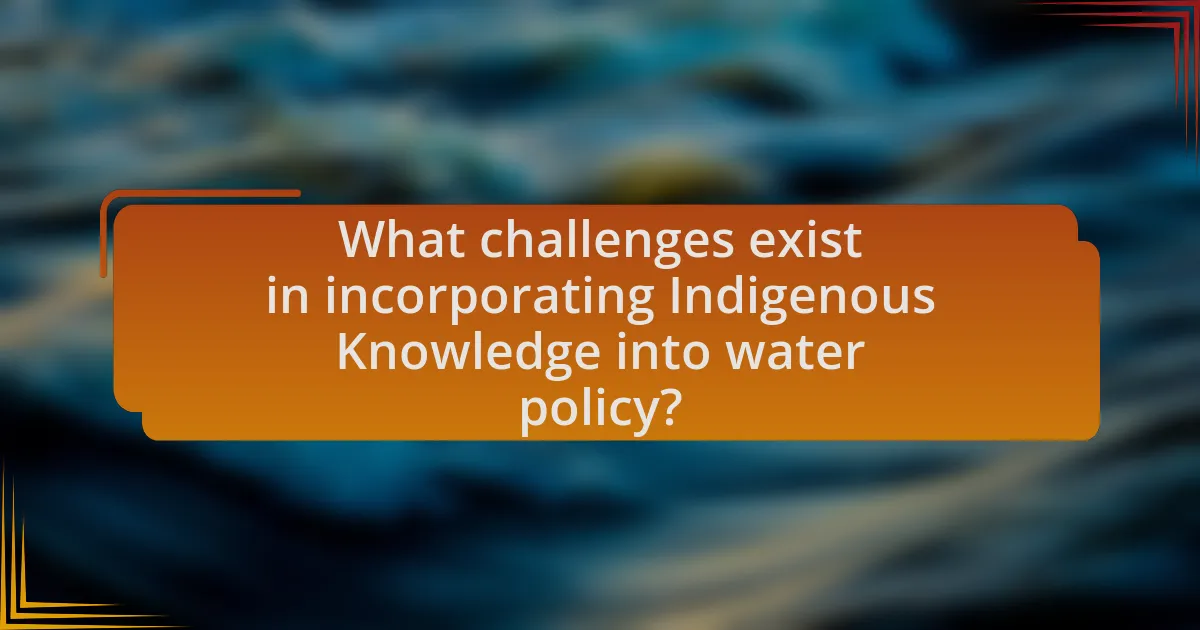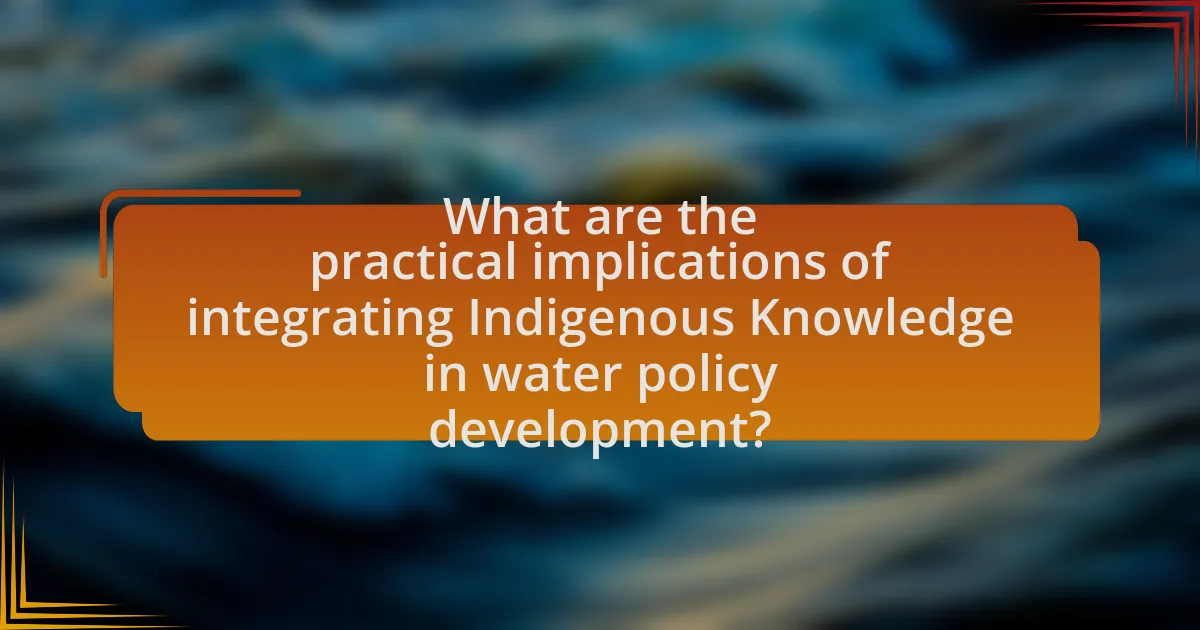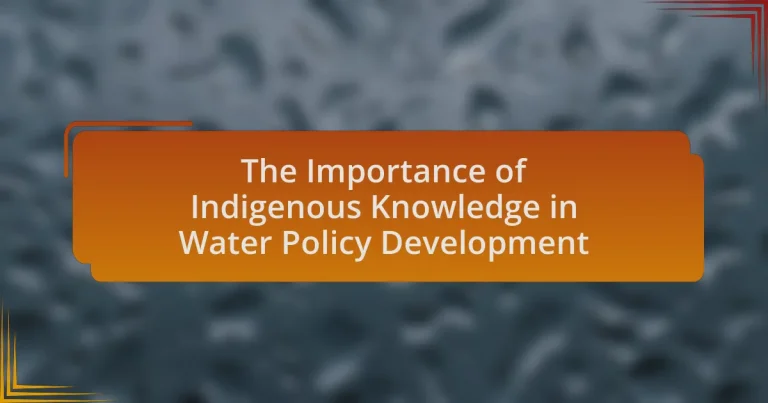The article emphasizes the critical role of Indigenous Knowledge in the development of water policies, highlighting its holistic understanding of local ecosystems and sustainable practices. It discusses how integrating Indigenous insights with scientific data leads to more effective water management, as demonstrated by successful case studies in regions like Canada and Australia. Key principles such as stewardship, intergenerational knowledge transfer, and the cultural significance of water are explored, alongside the challenges Indigenous communities face in influencing water policy. The article also outlines strategies for enhancing collaboration between Indigenous and non-Indigenous stakeholders, ultimately advocating for the incorporation of diverse knowledge systems to achieve sustainable water governance.
What is the Importance of Indigenous Knowledge in Water Policy Development?

Indigenous knowledge is crucial in water policy development as it provides a holistic understanding of local ecosystems and sustainable practices. This knowledge, accumulated over generations, includes insights into water management, conservation techniques, and the cultural significance of water resources. For instance, Indigenous communities often possess detailed knowledge about seasonal changes, water quality indicators, and biodiversity, which can enhance scientific approaches to water management. Studies have shown that integrating Indigenous knowledge with scientific data leads to more effective and culturally relevant water policies, as evidenced by successful collaborations in regions like Canada and Australia, where Indigenous practices have improved water quality and ecosystem health.
How does Indigenous Knowledge contribute to effective water management?
Indigenous Knowledge contributes to effective water management by integrating traditional ecological practices and cultural values that promote sustainable use and conservation of water resources. This knowledge encompasses a deep understanding of local ecosystems, seasonal changes, and water cycles, which has been developed over generations. For instance, Indigenous communities often employ methods such as rainwater harvesting and the use of natural filtration systems, which enhance water quality and availability. Studies have shown that incorporating Indigenous Knowledge into water management policies leads to improved ecological outcomes and community resilience, as evidenced by successful case studies in regions like Australia and Canada, where Indigenous practices have been recognized for their effectiveness in maintaining water quality and biodiversity.
What are the key principles of Indigenous Knowledge in relation to water?
The key principles of Indigenous Knowledge in relation to water include holistic understanding, stewardship, and intergenerational knowledge transfer. Holistic understanding emphasizes the interconnectedness of water with land, culture, and community, recognizing that water is not just a resource but a vital part of life. Stewardship involves the responsible management and protection of water resources, reflecting a deep respect for the environment and the belief that water must be preserved for future generations. Intergenerational knowledge transfer ensures that traditional practices and teachings about water management are passed down, maintaining cultural identity and ecological wisdom. These principles are validated by numerous Indigenous communities worldwide, who have successfully managed water resources sustainably for centuries, demonstrating the effectiveness of their knowledge systems in contemporary water policy development.
How does Indigenous Knowledge differ from scientific approaches to water policy?
Indigenous Knowledge differs from scientific approaches to water policy primarily in its holistic and community-centered perspective. Indigenous Knowledge encompasses traditional practices, cultural values, and a deep understanding of local ecosystems developed over generations, while scientific approaches often rely on quantitative data, controlled experiments, and standardized methodologies. For example, Indigenous communities may prioritize the spiritual and cultural significance of water, integrating it into their social practices, whereas scientific methods typically focus on measurable outcomes and empirical evidence. This distinction highlights the importance of incorporating diverse knowledge systems in water policy to address both ecological sustainability and cultural relevance.
Why is Indigenous Knowledge essential for sustainable water practices?
Indigenous Knowledge is essential for sustainable water practices because it encompasses traditional ecological wisdom that has been developed over generations. This knowledge includes an understanding of local ecosystems, water cycles, and the cultural significance of water, which informs effective management strategies. For instance, Indigenous communities often utilize practices such as seasonal water monitoring and the preservation of wetlands, which have been shown to enhance biodiversity and maintain water quality. Research indicates that integrating Indigenous Knowledge with scientific approaches can lead to more resilient water management systems, as evidenced by case studies in Canada and Australia where such collaborations have improved water governance and conservation outcomes.
What historical contexts support the integration of Indigenous Knowledge in water policy?
The historical contexts that support the integration of Indigenous Knowledge in water policy include colonial histories, treaties, and environmental movements. Colonial histories often marginalized Indigenous practices, yet they also highlight the resilience of Indigenous communities in maintaining their knowledge systems related to water management. Treaties, such as the United Nations Declaration on the Rights of Indigenous Peoples, recognize Indigenous rights to land and resources, emphasizing the importance of their knowledge in sustainable water governance. Furthermore, environmental movements in the late 20th century increasingly acknowledged Indigenous perspectives, leading to collaborative approaches in water policy that respect traditional ecological knowledge. These contexts demonstrate a growing recognition of the value of Indigenous Knowledge in addressing contemporary water challenges.
How does Indigenous Knowledge promote biodiversity and ecosystem health?
Indigenous Knowledge promotes biodiversity and ecosystem health by integrating traditional ecological practices that have been developed over generations. This knowledge encompasses sustainable land management techniques, such as rotational farming and controlled burning, which enhance soil fertility and promote diverse plant and animal species. For instance, Indigenous practices in the Amazon rainforest have been shown to maintain high levels of biodiversity by fostering a balance between agricultural needs and ecological preservation. Additionally, Indigenous communities often possess a deep understanding of local ecosystems, enabling them to manage resources in ways that protect habitats and species, thereby contributing to overall ecosystem resilience.
What challenges exist in incorporating Indigenous Knowledge into water policy?

Incorporating Indigenous Knowledge into water policy faces several challenges, primarily due to differing worldviews and governance structures. Indigenous Knowledge often emphasizes holistic and relational approaches to water management, contrasting with the reductionist and technical frameworks prevalent in mainstream water policy. This fundamental difference can lead to misunderstandings and conflicts over water rights and resource management.
Additionally, institutional barriers exist, such as a lack of recognition of Indigenous rights and the absence of inclusive decision-making processes. For instance, many water policies are developed without meaningful consultation with Indigenous communities, undermining their traditional practices and knowledge systems. Furthermore, there is often insufficient documentation and validation of Indigenous Knowledge within scientific frameworks, making it difficult to integrate into formal policy structures.
These challenges are compounded by historical injustices and ongoing marginalization of Indigenous peoples, which can create distrust towards governmental institutions. Addressing these issues requires a commitment to collaborative governance, respect for Indigenous rights, and the integration of diverse knowledge systems into water management practices.
What barriers do Indigenous communities face in influencing water policy?
Indigenous communities face significant barriers in influencing water policy, primarily due to systemic marginalization and lack of recognition of their rights. These communities often encounter legal and institutional obstacles that limit their participation in decision-making processes, as many water policies are developed without adequate consultation or inclusion of Indigenous perspectives. For instance, the United Nations Declaration on the Rights of Indigenous Peoples emphasizes the necessity of free, prior, and informed consent, yet many governments fail to implement these principles effectively. Additionally, socio-economic challenges, such as poverty and limited access to resources, further hinder Indigenous communities’ ability to engage in policy advocacy and negotiations.
How can these barriers be addressed to enhance participation?
Barriers to participation can be addressed by implementing inclusive frameworks that actively involve Indigenous communities in water policy development. Engaging Indigenous knowledge holders through collaborative decision-making processes ensures that their perspectives and traditional practices are integrated into policy frameworks. Research indicates that when Indigenous communities are involved, policies are more effective and culturally relevant, as seen in the case of the Great Lakes Water Quality Agreement, which incorporated Indigenous knowledge to improve water management outcomes. This approach not only enhances participation but also fosters trust and mutual respect between policymakers and Indigenous communities.
What role does government play in facilitating or hindering Indigenous involvement?
The government plays a crucial role in both facilitating and hindering Indigenous involvement in water policy development. By implementing policies that recognize Indigenous rights and knowledge, the government can enhance participation and collaboration with Indigenous communities, as seen in initiatives like the United Nations Declaration on the Rights of Indigenous Peoples, which encourages the inclusion of Indigenous perspectives in environmental governance. Conversely, government actions that neglect or undermine these rights, such as failing to consult Indigenous communities on water management decisions, can significantly hinder their involvement and perpetuate historical injustices. For instance, the lack of meaningful engagement in water policy discussions has led to conflicts over resource management, illustrating the impact of governmental approaches on Indigenous participation.
How can collaboration between Indigenous and non-Indigenous stakeholders improve water policy?
Collaboration between Indigenous and non-Indigenous stakeholders can improve water policy by integrating traditional ecological knowledge with scientific approaches, leading to more sustainable and culturally relevant water management practices. Indigenous communities possess a deep understanding of local ecosystems, which can inform policies that address specific environmental challenges. For instance, studies have shown that Indigenous land management practices, such as controlled burns and seasonal water use, enhance biodiversity and water quality. By combining this knowledge with modern scientific methods, stakeholders can create comprehensive policies that respect cultural values while effectively managing water resources. This collaborative approach has been recognized in various frameworks, such as the United Nations Declaration on the Rights of Indigenous Peoples, which emphasizes the importance of Indigenous participation in decision-making processes related to natural resources.
What are successful examples of collaborative water management initiatives?
Successful examples of collaborative water management initiatives include the Murray-Darling Basin Plan in Australia and the Great Lakes Water Quality Agreement in North America. The Murray-Darling Basin Plan, established in 2012, integrates the interests of various stakeholders, including Indigenous communities, farmers, and environmental groups, to manage water resources sustainably across a vast river system. This initiative has led to improved water quality and ecological health in the basin. The Great Lakes Water Quality Agreement, originally signed in 1972 and updated in 2012, involves collaboration between the United States and Canada, focusing on restoring and protecting the water quality of the Great Lakes. This agreement has successfully reduced pollution and enhanced habitat restoration efforts, demonstrating the effectiveness of collaborative governance in water management.
How can mutual respect and understanding be fostered in these collaborations?
Mutual respect and understanding in collaborations involving Indigenous knowledge can be fostered through active listening and inclusive dialogue. Engaging all stakeholders in open discussions allows for the sharing of diverse perspectives, which is essential in recognizing the value of Indigenous knowledge systems. Research indicates that when Indigenous communities are involved in decision-making processes, such as water policy development, it leads to more effective and sustainable outcomes (Berkes, 2012, “Sacred Ecology,” Routledge). This collaborative approach not only validates Indigenous perspectives but also builds trust and respect among participants, ultimately enhancing the effectiveness of water management strategies.
What are the practical implications of integrating Indigenous Knowledge in water policy development?

Integrating Indigenous Knowledge in water policy development leads to more sustainable and culturally relevant management practices. This integration enhances the understanding of local ecosystems, as Indigenous communities often possess centuries of knowledge about water sources, seasonal changes, and biodiversity. For instance, studies have shown that Indigenous practices can improve water quality and ecosystem health, as seen in the successful restoration of wetlands in North America through traditional ecological knowledge. Furthermore, involving Indigenous voices in policy-making fosters social equity and respect for cultural heritage, which is essential for community buy-in and long-term success of water management initiatives.
How can policymakers effectively incorporate Indigenous perspectives?
Policymakers can effectively incorporate Indigenous perspectives by actively engaging Indigenous communities in the decision-making process. This engagement should include recognizing and respecting Indigenous knowledge systems, which have been developed over centuries and are crucial for sustainable water management. For instance, the United Nations Declaration on the Rights of Indigenous Peoples emphasizes the importance of Indigenous participation in policies affecting their lands and resources. By integrating traditional ecological knowledge with scientific approaches, policymakers can create more holistic and effective water policies that reflect the values and needs of Indigenous peoples.
What strategies can be employed to ensure Indigenous voices are heard in policy discussions?
To ensure Indigenous voices are heard in policy discussions, strategies such as establishing formal consultation processes, integrating Indigenous knowledge systems into policy frameworks, and creating collaborative governance structures can be employed. Formal consultation processes, mandated by legal frameworks like the United Nations Declaration on the Rights of Indigenous Peoples, require governments to engage with Indigenous communities before making decisions that affect their rights and lands. Integrating Indigenous knowledge systems into policy frameworks acknowledges the value of traditional ecological knowledge, which has been shown to enhance environmental management and sustainability. Collaborative governance structures, which include Indigenous representatives in decision-making bodies, foster mutual respect and understanding, ensuring that Indigenous perspectives are actively considered in policy development.
What frameworks exist to support the integration of Indigenous Knowledge in water governance?
Frameworks that support the integration of Indigenous Knowledge in water governance include the United Nations Declaration on the Rights of Indigenous Peoples (UNDRIP), the Indigenous Water Policy Frameworks, and collaborative governance models. UNDRIP emphasizes the rights of Indigenous peoples to participate in decision-making processes affecting their water resources, ensuring that their traditional knowledge is recognized and respected. Indigenous Water Policy Frameworks, developed in various regions, provide guidelines for incorporating Indigenous perspectives and practices into water management strategies. Collaborative governance models facilitate partnerships between Indigenous communities and governmental bodies, promoting shared decision-making and the inclusion of Indigenous Knowledge in water governance practices. These frameworks collectively enhance the recognition and application of Indigenous Knowledge in managing water resources effectively.
What best practices can be adopted for successful integration of Indigenous Knowledge?
Successful integration of Indigenous Knowledge can be achieved through collaborative partnerships between Indigenous communities and policymakers. This approach ensures that Indigenous perspectives and practices are respected and incorporated into water policy development. Engaging Indigenous leaders and knowledge holders in the decision-making process fosters mutual respect and understanding, which is essential for effective collaboration.
Additionally, recognizing and valuing traditional ecological knowledge, which has been developed over generations, enhances the sustainability of water management practices. For instance, studies have shown that Indigenous land management techniques can lead to improved biodiversity and ecosystem health, which are critical for water resource sustainability.
Furthermore, providing education and training for both Indigenous and non-Indigenous stakeholders promotes a shared understanding of water issues and the importance of Indigenous Knowledge. This can lead to more informed and culturally sensitive policy decisions.
In summary, best practices for integrating Indigenous Knowledge include fostering collaborative partnerships, valuing traditional ecological knowledge, and promoting education and training among stakeholders.
How can ongoing education and training enhance understanding of Indigenous Knowledge among policymakers?
Ongoing education and training can significantly enhance understanding of Indigenous Knowledge among policymakers by providing them with structured learning opportunities that emphasize the value and application of this knowledge in decision-making processes. Such educational initiatives can include workshops, seminars, and collaborative projects that involve Indigenous communities, allowing policymakers to engage directly with traditional practices and perspectives. For instance, programs that incorporate Indigenous methodologies in environmental management have shown to improve policy outcomes by integrating local ecological knowledge, as evidenced by case studies in Canada where Indigenous-led water management practices have led to more sustainable resource use. This direct exposure fosters respect, builds relationships, and encourages the incorporation of Indigenous perspectives into formal policy frameworks, ultimately leading to more effective and culturally relevant water policies.
What role does community engagement play in the successful implementation of water policies?
Community engagement is crucial for the successful implementation of water policies as it fosters collaboration, enhances local knowledge integration, and builds trust among stakeholders. Engaging communities ensures that water policies reflect the specific needs and values of those affected, leading to more effective and sustainable outcomes. For instance, studies have shown that when local communities are involved in decision-making processes, the likelihood of policy acceptance and compliance increases significantly, as evidenced by the successful water management initiatives in various Indigenous communities across North America. These initiatives demonstrate that incorporating Indigenous knowledge and practices through community engagement leads to improved water resource management and resilience against climate change impacts.


